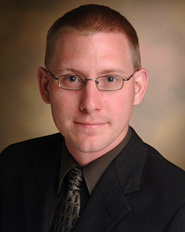
Alan Theisen (b. 4 October 1981; Port Huron, Michigan) is a Ph.D. graduate assistant in the Department of Music Theory at the Florida State University.
Composing since the age of sixteen, he has produced a steadily growing body of work distinguished by its musical energy and concentration of expression.
Representative works by Theisen include a Sonata for Alto Saxophone and Piano, Variations on a Theme of Gretchaninov, Eclogue for flute, and the Concerto for Alto Saxophone and String Orchestra (premiered by soloist Lawrence Gwozdz and the Szczecin Philharmonic in 2004). Recent compositions and commissions include Ritorno for flute and cello and a Triple Concerto. Noted composer Dimitri Terzakis commends Theisen's oeuvre as being "the product of a unique talent."
As a saxophonist, Theisen has toured the United States and Canada with the Sax-Chamber Orchestra, performing at two World Saxophone Congresses (Montreal - 2000, Minneapolis - 2003). He studied the instrument with internationally-recognized performer Lawrence Gwozdz and participated in masterclasses with famed saxophone pioneer Jean-Marie Londeix. No stranger to the podium, Theisen has been a guest conductor with several ensembles.
In an effort to showcase both his own original compositions and pieces by other contemporary composers, he founded the Intégrales New Music Festival in 2005. Now an annual event, Intégrales NMF features world-premiere performances by nationally recognized musicians. Intégrales has expanded to include musical collaborations with artists, authors, and dancers.
Theisen wrote his undergraduate thesis on György Ligeti's Piano Etudes, and has authored several papers on topics including Elliott Carter, film editing, composition as analysis, and Michael Brecker.
Other interests include mathematics, film criticism, and philosophy; in addition, Theisen has performed the role of Oberon in a production of Shakespeare's A Midsummer Night's Dream, for which he also wrote the incidental music.
Theisen lives with his wife (and puts up with their two cats) in Tallahassee, Florida.
|
|
|
|
|
|

Saturday, July 02, 2005
Credo
I was recently asked by a student whether I thought pre-compositional decisions hindered the creative impulse, and to what purpose these "intellectual games" really played in the generation of great art. My answer was much like the following quote taken from a Princeton lecture by Elliott Carter:
"Whether the composer is conscious of it or not, a field of operation with its principles of motion and of interaction is stated or suggested at the beginning of any work. The field may be tonal, employ tradtional harmony, or it may be unrelated to tradtional harmony, as my music seems to be nowadays, in which case I feel it imperative to establish clearly, near the beginning, the principles upon which the composition moves. Once this field of operation is established, its possibilites are explored, interesting new aspects of it are revealed, patterns of action of contrasting types emerge as the work goes along.
A work whose world is not clearly defined loses a great deal of possible power and interest; one whose world is too narrow and restricted runs the risk of being thin, although if the world is unusual enough this narrowness can produce a kind of hallucinatory quality - one that I do not concern myself with in my own works.
This extension of the traditional methods of coherence can rarely be attained nowadays solely by intuition, I think, because of the vast number of musical means, new and old, that we know. Some composers, it is true, insulate themselves from new musical experiences in an effort not to be distracted. Others, whose curiosity and interest prompt them to follow what is going on...have to make a number of conscious choices and establish the frame in which to work before they can compose at all."
I wish I had had this excerpt for my student (it is much more elegant than my answer was). I suppose the above three paragraphs serve as my credo - how I create music and how I look at works by others.
posted by Alan Theisen
Friday, July 01, 2005
One More Under My Belt
Yesterday I completed a solo work for flute - Immer Fließend. I composed it for my fiancée on the occasion of her birthday. Although the piece is only three minutes long, it was a real challenge to write; I tried to create a piece with melodies, yet no themes (think of Schoenberg's Erwartung or Bartok's Second String Quartet and you'll understand my model). Instead, a set of intervals (m2, M2, m3, P5, M6, M7) creates a nucleus for ideas to constantly spin out of and mutate.
What I discovered: Three minutes is a long stretch to pen when you're avoiding themes! I can't think of another piece I've written that didn't begin in my head as a theme to be developed. Immer Fließend definitely streched my compositional muscle. I recommend this exercise for anyone!
I'll be posting a recording and a short excerpt from the score on the S21 Wiki Listening Room as soon as I figure out how to do so.
I guess now I have to get back to that Triple Concerto....
(On a sidenote, thanks to everyone who sent me pieces to consider for Integrales 2006. Keep them coming!)
posted by Alan Theisen
|
| |



